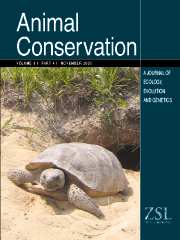Crossref Citations
This article has been cited by the following publications. This list is generated based on data provided by
Crossref.
Tsitrone, Anne
Rousset, François
and
David, Patrice
2001.
Heterosis, Marker Mutational Processes and Population Inbreeding History.
Genetics,
Vol. 159,
Issue. 4,
p.
1845.
Hedrick, Philip
Fredrickson, Richard
and
Ellegren, Hans
2001.
EVALUATION OF d2, A MICROSATELLITE MEASURE OF INBREEDING AND OUTBREEDING, IN WOLVES WITH A KNOWN PEDIGREE.
Evolution,
Vol. 55,
Issue. 6,
p.
1256.
Treydte, Anna C.
Williams, Joseph B.
Bedin, Eric
Ostrowski, Stéphane
Seddon, Phillip J.
Marschall, Elizabeth A.
Waite, Thomas A.
and
Ismail, Khairy
2001.
In search of the optimal management strategy for Arabian oryx.
Animal Conservation,
Vol. 4,
Issue. 3,
p.
239.
Hedrick, Philip
Fredrickson, Richard
and
Ellegren, Hans
2001.
EVALUATION OF d 2, A MICROSATELLITE MEASURE OF INBREEDING AND OUTBREEDING, IN WOLVES WITH A KNOWN PEDIGREE.
Evolution,
Vol. 55,
Issue. 6,
p.
1256.
Pitra, Christian
Hansen, Anders J.
Lieckfeldt, Dietmar
and
Arctander, Peter
2002.
An exceptional case of historical outbreeding in African sable antelope populations.
Molecular Ecology,
Vol. 11,
Issue. 7,
p.
1197.
Taylor, Andrea C.
2002.
Reproductive Science and Integrated Conservation.
p.
67.
Holt, William V.
Pickard, Amanda R.
Rodger, John C.
and
Wildt, David E.
2002.
Reproductive Science and Integrated Conservation.
p.
21.
Újvári, Beáta
Madsen, Thomas
Kotenko, Tatiana
Olsson, Mats
Shine, Richard
and
Wittzell, Håkan
2002.
Low genetic diversity threatens imminent extinction for the Hungarian meadow viper (Vipera ursinii rakosiensis).
Biological Conservation,
Vol. 105,
Issue. 1,
p.
127.
Goossens, Benoît
Funk, Stephan M.
Vidal, Carmen
Latour, Stéphanie
Jamart, Aliette
Ancrenaz, Marc
Wickings, Elisabeth J.
Tutin, Caroline E. G.
and
Bruford, Michael W.
2002.
Measuring genetic diversity in translocation programmes: principles and application to a chimpanzee release project.
Animal Conservation,
Vol. 5,
Issue. 3,
p.
225.
Marshall, T. C.
Coltman, D.W.
Pemberton, J.M.
Slate, J.
Spalton, J. A.
Guinness, F. E.
Smith, J. A.
Pilkington, J. G.
and
Clutton–Brock, T. H.
2002.
Estimating the prevalence of inbreeding from incomplete pedigrees.
Proceedings of the Royal Society of London. Series B: Biological Sciences,
Vol. 269,
Issue. 1500,
p.
1533.
Slate, J.
and
Pemberton, J. M.
2002.
Comparing molecular measures for detecting inbreeding depression.
Journal of Evolutionary Biology,
Vol. 15,
Issue. 1,
p.
20.
LeBas, Natasha R.
2002.
MATE CHOICE, GENETIC INCOMPATIBILITY, AND OUTBREEDING IN THE ORNATE DRAGON LIZARD, CTENOPHORUS ORNATUS.
Evolution,
Vol. 56,
Issue. 2,
p.
371.
LeBas, Natasha R.
2002.
MATE CHOICE, GENETIC INCOMPATIBILITY, AND OUTBREEDING IN THE ORNATE DRAGON LIZARD, CTENOPHORUS ORNATUS.
Evolution,
Vol. 56,
Issue. 2,
p.
371.
Moran, P.
2002.
Current conservation genetics: building an ecological approach to the synthesis of molecular and quantitative genetic methods.
Ecology of Freshwater Fish,
Vol. 11,
Issue. 1,
p.
30.
Zschokke, Samuel
and
Baur, Bruno
2002.
Inbreeding, outbreeding, infant growth, and size dimorphism in captive Indian rhinoceros (Rhinoceros unicornis).
Canadian Journal of Zoology,
Vol. 80,
Issue. 11,
p.
2014.
Coltman, D. W.
and
Slate, J.
2003.
MICROSATELLITE MEASURES OF INBREEDING: A META-ANALYSIS.
Evolution,
Vol. 57,
Issue. 5,
p.
971.
Mésochina, Pascal
Bedin, Eric
and
Ostrowski, Stéphane
2003.
Reintroducing antelopes into arid areas: lessons learnt from the oryx in Saudi Arabia.
Comptes Rendus Biologies,
Vol. 326,
Issue. ,
p.
158.
Coltman, D. W.
and
Slate, J.
2003.
MICROSATELLITE MEASURES OF INBREEDING: A META-ANALYSIS.
Evolution,
Vol. 57,
Issue. 5,
p.
971.
Randi, Ettore
Davoli, Francesca
Pierpaoli, Massimo
Pertoldi, Cino
Madsen, Arksel Bo
and
Loeschcke, Volker
2003.
Genetic structure in otter (Lutra lutra) populations in Europe: implications for conservation.
Animal Conservation,
Vol. 6,
Issue. 2,
p.
93.
Edmands, Suzanne
and
Timmerman, Charles C.
2003.
Modeling Factors Affecting the Severity of Outbreeding Depression.
Conservation Biology,
Vol. 17,
Issue. 3,
p.
883.




